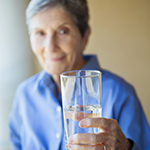 Though hydration is important for healthy living at any age, seniors are at greater risk of dehydration due to physical and physiological changes that occur during the natural aging process. With potentially dangerous symptoms of dehydration like disorientation, constipation, and low blood pressure, it is important to keep your loved one hydrated.
Though hydration is important for healthy living at any age, seniors are at greater risk of dehydration due to physical and physiological changes that occur during the natural aging process. With potentially dangerous symptoms of dehydration like disorientation, constipation, and low blood pressure, it is important to keep your loved one hydrated.
We asked Brian Cooper, a Residential Home Health Occupational Therapist, to share some strategies that caregivers can use to help ensure their loved one regularly drinks water. Here are the tips that have helped many of his patients and their caregivers:
- Try flavored water. While there are several kinds available, please keep in mind that individuals with diabetes need sugar-free water. Propel offers Propel Zero as a sugar-free option.
- Does your loved one like juice? Try mixing in water to increase the intake of H2O.
- Be assertive! The urge to drink may diminish with age, so a gentle reminder to take a sip may be helpful.
- Name-drop. Your loved one may be more inclined to follow directions to drink water if you remind them that “the doctor said it was important.”
- Rethink your drink wear. An opaque, colored cup is easiest to see and an adult sippy-cup with a straw can assist with the actual process of drinking.
- Set a daily drink intake goal. Fill a pitcher with the necessary amount of water and make sure it is gone at the end of the day.
- Make sure there is not a physical challenge keeping your loved one from drinking. Once he or she has initiated the drinking process, do liquids go down correctly and without issue?
- Be creative. Did you know that foods like fruit have a high water content? Popsicles are a great alternative too!
Remembering to consume water can be especially difficult for individuals coping with dementia. A common symptom of dementia, urinary incontinence can actually be improved through proper hydration. For additional help in managing urinary incontinence associated with dementia, download our Guide to Dementia and Incontinence: Causes and Solutions.
This guide provides insight into:
- Identifying the cause of incontinence
- Why dementia causes incontinence
- What to do when dementia is the cause of incontinence
- How to handle ‘accidents’
- Caregiver tips
Here’s another great resource from the Nestle Nutrition Institute. It helps explain the gradual aging of the body and how these changes can affect seniors. Healthy Aging: why is being well hydrated so important?

